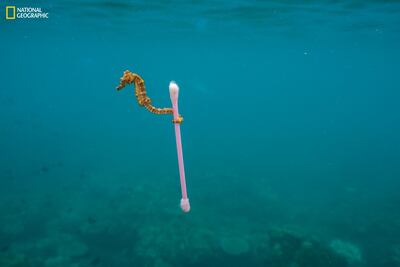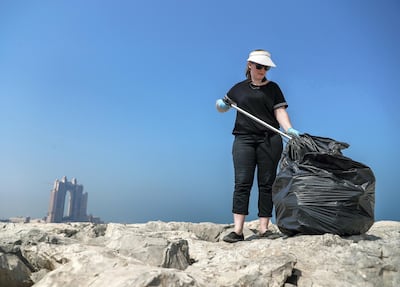Midway Island is one of the most remote pieces of land on the planet. A minuscule fragment of American territory in the North Pacific, it's more than 3,000 kilometres from the nearest continent, and has never been inhabited by humans. The skies and waters there are full of albatrosses, and seals roll on breaking waves that crash on to shores of pure white sand. It's a small piece of paradise where human visitors are not allowed, so you'd think this place, if anywhere, would be free from the damage caused by the reckless behaviour of our species.
Instead, the island is scattered with the remains of magnificent albatrosses, many of them degraded to nothing more than fragile skeletons – each with a mound of plastic debris at its centre, where their stomachs once were. It's like some kind of macabre, decaying art installation. Those beaches might be bereft of sunbathing tourists, but their shorelines are home to thousands of tonnes of plastic waste – ranging from the heads of mannequins to umbrella handles, toilet cistern ball cocks and toothbrushes, washed up from Japan, China, the United States and even Scotland.
Plastic is everywhere around us
It’s impossible to imagine a life without plastic. In one form or another, it is an integral part of each of our lives – it’s used to make our cars and our homes. The Blu-Ray discs and DVDs lined up on our shelves are made from it, as are their cases. Perhaps even the shelves they’re on are made from plastic. It’s used to make our money, furniture, kitchenware, clothes and the pegs we hang them out to dry with. We brush our teeth, scrub our nails and exfoliate our skin with it.
Our smartphones are made from it, as are our white goods. Some people are even kept alive with artificial hearts fashioned from plastic. It’s everywhere – a miracle material with infinite uses and available in seemingly limitless forms. A blessing, surely, but also the cause of the biggest environmental catastrophe the world has seen.
Plastic is killing our planet and has been steadily doing so since 1907, when Leo Baekeland invented the first fully synthetic plastic, which came to be known as Bakelite. Strong, light and cheap to produce, it could be fashioned into practically anything, meaning piano keys didn’t need to be made from ivory and electric cables no longer had to be coated with dangerous fabrics. It didn’t take long for plastic to change the world and, for a while, it seemed that it could do no wrong – a disposable society had arrived, which meant less effort for everyone. What nobody understood, though, was that plastics would always be here.
Of all the countless trillions of tonnes of plastics produced over the past century, half have been made in the past 15 years as the world’s population has grown and, as a species, we have become increasingly reliant on the stuff. And if we think it’s bad now, what lies ahead is beyond comprehension, because plastic does not degrade. It simply changes shape, becomes smaller and does more damage. Estimates vary, but it’s believed by scientists that plastics will not degrade for up to 1,000 years.
The problem with plastic
Over the next few weeks, we are going to highlight some of the individual problem areas for plastic pollution. Unlike issues such as climate change and deforestation, which seem too overwhelming to address, it’s in our power to figuratively and literally turn the tide on plastic pollution. And we’re starting with the one thing none of us can escape from: plastic bags.
They've been in worldwide use since the 1960s, and almost every single one that's ever been made still exists in some form. The problems associated with plastic bags being disposed of in landfill are bad enough – apart from being an eyesore, they emit harmful greenhouse gases and, when they're blown into open areas, are ingested by animals, who mistake them for food. It's thought by conservationists that half of all premature camel deaths are caused by them eating plastic bags – a cruel, painful way for any creature to die.
The ultimate destination of this waste, however, is our oceans. Our planet’s seas are all interconnected, meaning that a supermarket shopping bag that blows away while you’re loading your food into the back of your car could end up in the Gulf and, within a few months, be responsible for the death of a loggerhead turtle in the Mediterranean, or a penguin in the Arctic. Sea creatures, like turtles, feed on jellyfish and, when a plastic bag is submerged, there’s no way to tell them apart.

Official statistics are difficult to come by but, according to the UAE's Ministry of Climate Change and Environment, in 2013, residents of the country were using 11 billion plastic bags a year, and there's little reason to assume that number has decreased since then. But it needs to. In the United Kingdom, legislation has forced major retailers to charge £0.05 (Dh0.25) for each single-use plastic bag and, as a direct result, billions fewer are entering the collective waste stream each year. The UAE is now showing signs of following that example.
What's being done in the UAE
Supermarket chains Waitrose and Spinneys, which in the UAE are under the Fine Fare Food Market umbrella, both recently announced that they would be charging for single-use plastic bags in a trial over the next three months at selected stores. Matt Frost, the chief executive of Fine Food Fare told The National that the company recognises that it has a responsibility to help reduce plastic waste.
"We want to be the supermarket at the forefront of leading that change and showing leadership for the retail industry in the UAE," he says. "Being an independently owned retailer, we benefit from being able to listen to our customers and react to the changing shape of the retail landscape quickly and effectively, and in order to bring about change, we want to help our customers make small changes, to eventually lead to positive habits."
_____________________
Read more:
Waitrose to start charging for plastic bags in Abu Dhabi
Profligate plastic waste needs action now
Here are 5 initiatives currently happening in the UAE to stop plastic pollution
UN World Environment Day - in pictures
_____________________
Anyone who goes grocery shopping in the UAE will be aware that bags are used for the smallest items – have you ever been asked if you need one for that (already bagged) bunch of bananas? Overuse is a real problem, and Frost is well aware of this. He says that, leading up to the trial, checkout staff have been getting trained to make them aware of what's happening and why.
“Our checkout staff will make a conscious effort to reduce packing unnecessary bags where possible,” he says, “and will encourage customers to use the in-store bag exchange or bring reusable shopping bags. We are also about to expand our range of affordable, reusable shopping bags, made from natural cloth, so that customers have more choice,” he says.
The bag-exchange element of the trial is to be applauded – it’s a facility for shoppers to return their used plastic bags so they can be re-used by future customers. As a step in the right direction, it would appear that existing Waitrose and Spinneys customers are prepared to get behind it, but similar initiatives have been started and discontinued by other large retailers in the UAE. That lack of success has been attributed in part to the demographic of the majority of the customers using those specific brands, who have so far been less environmentally aware. Frost is convinced, though, that this time around there will be a positive result.

Let's hope so. The scheme commenced on June 16 and will run for 12 weeks – if it's a success, it is likely to become a permanent fixture in all the group's shops. All the funds raised from the sale of these bags will be invested in further, similar initiatives.
Entire countries elsewhere have banned single-use plastic bags outright, with Oman’s government having announced that they’ll be outlawed later this year. Bangladesh banned them after they were found to have blocked sewers and drainage systems around the country, causing devastating floods in 1988 and 1998, which submerged two thirds of the entire country. Europe is making moves, and shoppers throughout India have already become used to taking their own bags when heading to the shops. A similar ban here might yet happen, so it’s timely advice for us all to plan ahead, take an old bag shopping and start reversing the damage. Our children will thank us for it.

